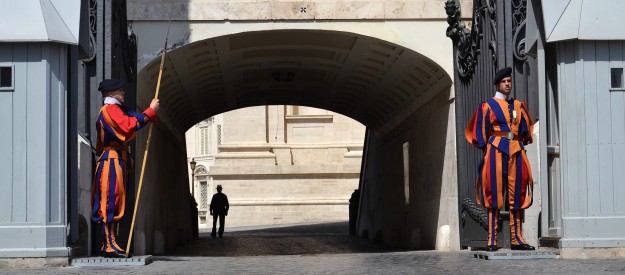"We are losing our attitude of wonder, of contemplation, of listening to creation and thus we no longer manage to interpret within it what Benedict XVI calls 'the rhythm of the love-story between God and man.'"
+ Pope Francis
Welcoming the new magi

We celebrate the three wise men in Matthew’s Gospel every January on the Feast of the Epiphany. Then we put them and their lessons away until next year. But really, we should keep this event in our hearts always.
These strangers from far-off lands were not Jewish and they came not knowing Christ—yet we sing their praises and proclaim their encounter with the King of Kings thanks to Matthew, who thought the event an important historical detail to capture.
Why, then, are so many today so afraid today when non-believers journey to the Vatican to confer on eco-issues?
A few weeks back activist Naomi Klein spoke at a pontifical conference. In a few days, mayors and other political leaders will follow to discuss human trafficking and climate change. Klein and these leaders are, I think, something like the new magi of the East.
Certainly they won’t all be doing Christ homage. But some might have their soul touched while working with the Church on issues of common concern to both.
An interesting detail not present in Matthew’s account is how many magi came to Christ in Bethlehem. The number three is traditional—one of those memories kept alive in the life of the Church but not recorded in scripture. Perhaps there were more that set out on that journey but of them only three allowed their encounter with Christ to change them. (There’s also the fact that with their gifts of gold, frankincense and myrrh, they came with knowledge of who Christ was and what He came to do.)
Such exegetical wonderings are not simply academic. They tell us something about the position that we, the Church, find ourselves today: wise men and women are journeying to us, seeking our help, and we would not be Christ’s disciples if we turned them away.
Dialogue
In Laudato Si’ Pope Francis exhorts us to dialogue. He has always done so with his “theology of encounter,” which shows us again and again what it means to follow Christ: speaking with anyone who wants to talk with us—and, we hope, in doing so allowing them an encounter with Christ if we act authentically as His disciples. This has also been the desire of Pope Francis's predecessors.
And yet the chorus of complaint continues: “The Church should not be working with the pro-abortion, the pro-same-sex marriage, or the pro-anything-that-runs-counter to the Gospel.”
Keep in mind that for two decades I was away from the Church. In that time I was pro-abortion and not particularly enthusiastic about many of the Church’s social and sexual teachings. That I am teaching and defending (and trying to live) the Church’s teachings today is because a local priest dared to speak with me and brought me home thanks to the truth of Christ, a caring disposition, and God’s grace.
Let’s give others the chance that that priest gave me. Let’s talk, break bread, and, by the grace of God, maybe even win hearts.
The risks
That said, I understand the concerns. As another priest friend put it, when you invite those with countering views (especially those on life) to the Vatican, “then they claim that honor as if they can speak for the Church.”
Naomi Klien did so in a recent piece in the New Yorker. Her honest commentary included a few unfortunate statements about the Church’s understanding of Genesis and the views of St. Augustine on the physical world. Her readers may not know any better to question these statements, and so they may have read those words as authoritative since, well, you know, the Vatican did want to hear what she had to say.
And soon, no doubt, many pro-abortion mayors, like California’s Jerry Brown, can return to their political parties celebrating a photo of them and Pope Francis, because, well, you know, this pope doesn’t really think the same way as those other popes did.
Such are the risks when we do the dirty work of bringing light into the darkness of the world. This was the risk that Christ took as did all Christians that we know of because they made a name for themselves interacting with human history.
And so must we if we are to claim ourselves to be His followers.


















